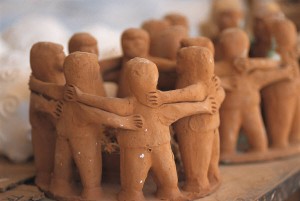Community and a sense of belonging are basic human needs. As I have been talking with several MKs (both former BFA students and other acquaintances), a recurring theme in transition is both the need for community and the difficulty in finding or creating it.
 TCKs are used to short, intense relationships. They move to a new place and know that in order to survive, they must develop friendships quickly. They don’t have the luxury of spending time developing a long-term relationship slowly since they might be moving again soon. In order to survive, they (usually) prefer to go deep quickly. This is not to say that TCKs reveal their deepest layers completely to new friends – they just avoid superficial discussions and jump right to heart issues when forming friendships. There is no time to waste on small talk in a relationship that has a deadline. Every moment has value and must be filled with meaning and intensity.
TCKs are used to short, intense relationships. They move to a new place and know that in order to survive, they must develop friendships quickly. They don’t have the luxury of spending time developing a long-term relationship slowly since they might be moving again soon. In order to survive, they (usually) prefer to go deep quickly. This is not to say that TCKs reveal their deepest layers completely to new friends – they just avoid superficial discussions and jump right to heart issues when forming friendships. There is no time to waste on small talk in a relationship that has a deadline. Every moment has value and must be filled with meaning and intensity.
When moving to a new place, TCKs may at first find it difficult to feel a sense of community because the people around them are not opening up as quickly as they would like. Yet it is not shallowness or an unwillingness on the part of the North Americans to form a community; it is simply a different understanding of the expected process of forming community. Expectations on “how” and “how long” differ, while the end goal may be the same.
 A BFA student who just moved to college in the South felt that the other students were unwilling to go deep and form community. Yet after a semester and a crazy ice storm, she noticed people starting to open up. She was feeling the need and lack of community for a whole semester, while the other students were probably approaching that semester with the understanding that deeper, rooted relationships take time to discover after they know who they can trust.
A BFA student who just moved to college in the South felt that the other students were unwilling to go deep and form community. Yet after a semester and a crazy ice storm, she noticed people starting to open up. She was feeling the need and lack of community for a whole semester, while the other students were probably approaching that semester with the understanding that deeper, rooted relationships take time to discover after they know who they can trust.
 My first exposure to these differences in forming community came at Black Forest Academy. Even among staff members, relationships were intense. Just like the students, we never knew whether our friends would be there for more than a year. Maybe they intended to come back the next year, but their support would run out, or a new job opportunity would present itself. There was no guarantee of longevity, so we made the most of every moment. I learned how to intentionally seek relationships and deepen community, but I also developed the expectation that relationships “normally” can form quickly.
My first exposure to these differences in forming community came at Black Forest Academy. Even among staff members, relationships were intense. Just like the students, we never knew whether our friends would be there for more than a year. Maybe they intended to come back the next year, but their support would run out, or a new job opportunity would present itself. There was no guarantee of longevity, so we made the most of every moment. I learned how to intentionally seek relationships and deepen community, but I also developed the expectation that relationships “normally” can form quickly.
This summer I’m getting married and moving to a place where people primarily experience relationships formed slowly over a long period of time. The concept of short, intense relationships is quite foreign. As I look ahead to being there for the foreseeable future, I find myself needing to adjust my own expectations. I cannot expect the people around me to respond to my desperate craving for community; I have to expect that community will form slowly (although thankfully I will already have a very deep relationship with one person – my husband!).
For those of you who are TCKs moving to college or a new place, try to align your expectations with the type of community you are entering. You may need to expect that your relationships will develop more slowly than your normal rate.
 Just as moving to a long-term community can pose its challenges, it can be even more frustrating to move to a new place for a short time. There is still a deep need for community, but it can be difficult for the locals who have lived there for generations to invest in a short-term relationship that is just a blip on the screen of their lives.
Just as moving to a long-term community can pose its challenges, it can be even more frustrating to move to a new place for a short time. There is still a deep need for community, but it can be difficult for the locals who have lived there for generations to invest in a short-term relationship that is just a blip on the screen of their lives.
So what do you do when you are just in a place for a short time? Do you withdraw and rely on your long-distance, long-term friends? Do you expend all your energy trying to fit in and make social connections? Do you try to externally fit in while still feeling like an outsider on the inside? Do you scan your acquaintances and try to guess who might “get” you, and if no one does you just live an isolated life for a short period of time?

I don’t think there is a one-size-fits-all answer to this question. Isolation is never good. We were not created to live alone. We need community. We each need to do our part, whether that means seeking community for ourselves in transition, or providing community for those travelers and newcomers who enter our own well-established circles.

